[Techie Tuesday] From working on Google’s search platform to co-founding Dunzo - the journey of Mukund Jha
This week, we feature Co-founder and CTO of Google-backed Dunzo Mukund Jha, who believes the best part of technology is the possibilities. He also talks about the need for techies to keep experimenting.
Mukund Jha has been coding for a long time now, since his early childhood to be precise. The Co-founder and CTO of Dunzo says today he codes close to five hours in a week. But he still spends a majority of his time debugging, which he sees as a puzzle waiting to be unravelled.
“Something is going wrong somewhere and there are too many variables on how to zero in on what the problem is. That is what makes debugging fun,” says Mukund.
From building Google’s ‘Education for All’ platform to starting up many times, Mukund believes a healthy mix of impatience and laziness can go a long way for an engineer.
“It is only then you want to keep building to make life around you easier and simpler,” says Mukund.
And this interest in building something to turn things around was a lead-up to something bigger – Dunzo, a hyperlocal delivery platform, which is the first company to be backed by Google.
1566210615008.png?fm=png&auto=format)
Mukund Jha, Co-founder and CTO, Dunzo
At Dunzo, Mukund has been responsible for taking the product from its initial WhatsApp days to a complete working prototype to what it is today. He works closely behind every possible variable needed to get a task done on the hyperlocal delivery platform with least human intervention.
From fetching something you forgot at home to asking for a pickup and drop, Dunzo makes use of artificial intelligence to manage customers’ tasks.
“We are also looking at setting up Dunzo Essential Stores, which makes delivery easier and helps us get to handle different variables,” says Mukund.
Mukund explains that the reason why Dunzo was able to scale is because they focused on building a strong base.
In a conversation with YourStory, Mukund talks about how he got hooked to coding and programming early, and about landing his dream job at Google. He also charts his journey of transforming Dunzo from a chat-based product to focusing on the supply side.
From a game to C++
Born in Chandigarh, Mukund’s father was an electrical engineer and his mother a homemaker. Though his father had a difficult childhood due to his family conditions, he nonetheless triumphed and got into IIT Kanpur.
Mukund says this changed his life completely.
“My love for engineering came from my father,” says Mukund.
A programmer since the age of 10, Mukund started coding early with C++ when his father got him and his brother a programming CD instead of a game.
In the late 90s, when the internet was gaining popularity, Mukund and his brother, who were in their pre-teens, would spend most of their time at internet cafés and chat rooms, playing games.
“Initially, we would play a lot of games, and do lot of projects in terms of navigation and Corel Draw. While the 10-year-old me was disappointed to get a programming CD instead of a gaming one, I know that is what hooked me to coding and programming. I couldn’t stop after that; I had to keep experimenting. It was fascinating, right from a calculator to a game, you could make anything of your own,” Mukund says.
A successful swap
Despite his early interest in coding, Mukund doesn’t call himself a model student, at least while he was in school. While he was good at academics, Mukund says he was a ‘rowdy’ student.
“I would bunk school and go watch movies. I was even suspended from school. I wasn’t really serious, and was more focused on general teenager stuff,” he recollects.
But he worked his way up and got admitted to NIT Allahabad, where he chose to study electrical engineering. He says that at NIT, if one had a better ranking, they had the option of shifting to a branch of their choice.
And to Mukund’s luck, one of his friends, who was in computer science, wanted to do electrical engineering. So, they swapped seats.
“It was 2005, and Google was big then. I wanted to be there. I was fascinated by how they could connect the world and the endless possibilities they could build,” Mukund says.
While in college, Mukund went to IIT-Madras for an internship. He also started trying for different research internships, and sent close to 5,000 emails to different universities.
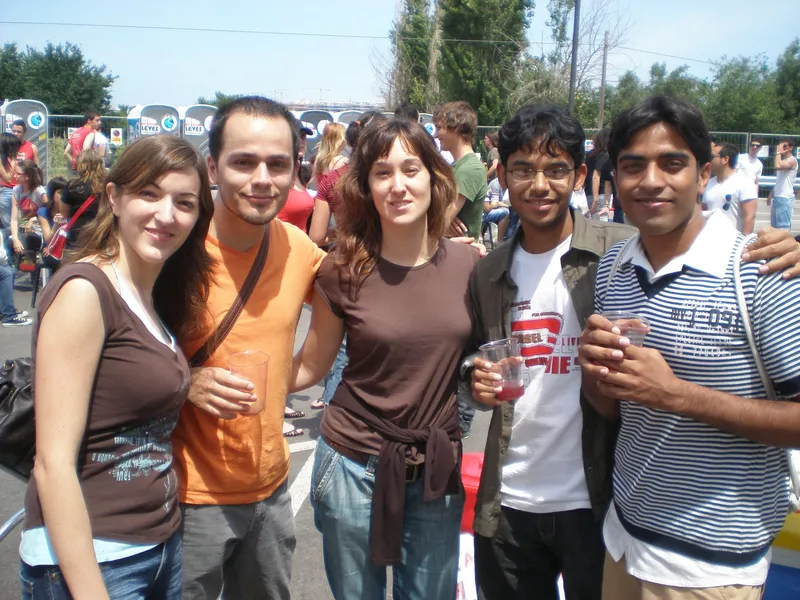
Mukund Jha with his batchmates at Columbia University
Building tech also started early on for Mukund. During his college days, he worked on speech technology and built a speech synthesiser from scratch in 2007. He interned at UPV Universitat Politecnica De Valencia, Spain, in 2008, where he worked on developing a speech recognition engine.
“After college, I was wondering what next. My brother was taking the PhD route, and even I thought about it, but then when I joined for master's course at Columbia University, I realised I was more inclined towards building products with my hands,” says Mukund.
He, however, describes the first semester of his college in the US as one of the toughest. There was a lot of work, but I learnt so much more there - about working with different people and learnt to understand everything, he says. At Columbia, he went on to do his master's in machine learning (ML) and also published a couple of papers on NLP and Social Data Mining.
The dream job at Google
While in the US, he worked at Columbia Business School where he developed a content management system. “By this time, I kept working and focusing strongly on machine learning and the possibilities it would bring in. It was 2008, the year of the financial crisis, and the only thing running in our mind as young graduates was how were we going to get jobs and internships,” Mukund says.
Nevertheless, he managed to land a few research projects and internships at the university.
In 2010, Mukund got his dream project - an opportunity to intern at Google. At Google, Mukund was working directly with the Director of Engineering.
“I worked on the ‘Education for All’ product and we built that together. We would work nights building it. It was an edtech platform similar to Udacity,” says Mukund.
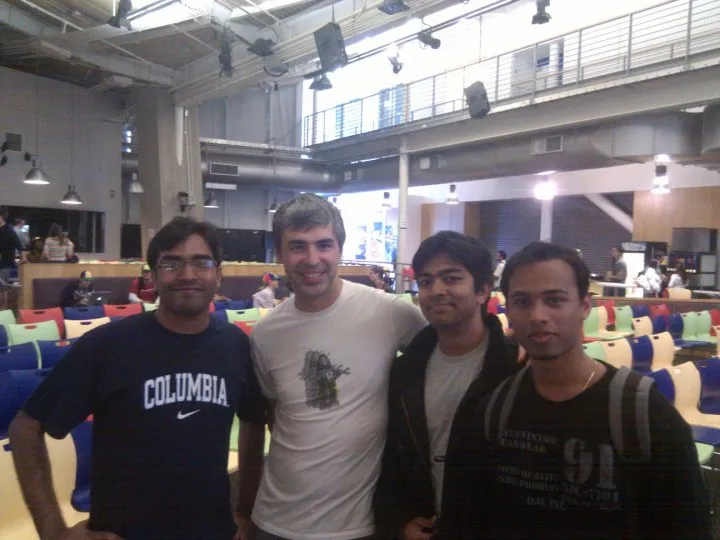
Mukund with Larry Page, Co-founder of Google.
While at Google, he also got several opportunities to work with the early leadership and the founding team.
“It was my dream come true. Plus, the exposure I got was significantly high. After college, I got an offer at Google, but I wanted to work specifically for Search in New York,” Mukund says.
Mukund joined the team and worked on Search Quality. Here, he worked in the search ranking team and did about 20 percent projects on assistant, news, and knowledge graph.
“Once you join Google, the first thing that hits you is everyone is so intelligent. And everyone feels that - because you have the best and the smartest minds in the ecosystem. It is an imposter syndrome of sorts and you want to work and prove that you are worth it,” Mukund says.
Bitten by the startup bug
However, by 2012, the startup ecosystem in the US was exploding. And bitten by the startup bug, Mukund decided to start something of his own. He later went on to launch his own startups.
While Mukund would keep building different products and things during his college days, they weren’t marketable.
“After Google, I really wanted to build something that would be different. So, along with a couple of batchmates, we started Wisdom.ly, a group video platform for virtual meetups and conferences,” Mukund says. Started in 2013, Wisdom.ly was one of the 20 companies that was chosen for the Startup Chile programme.
“Startup Chile was a great networking opportunity and gave good exposure. You get to meet different startups, understand different products, and ideas. But we soon had to shut shop as there was no product-market fit. It is then you learn how important product-market fit is, and why it is important to understand if your customer really needs a product.”
For close to two weeks, Mukund and his batchmate, Alex Glocus, brainstormed on different ideas, and finally landed on building Habet in 2014. Habet was an intelligent goal tracking platform that paid you to succeed. They offered challenges by using a combination of expert guidance, accountability, and cash rewards to help users accomplish more.
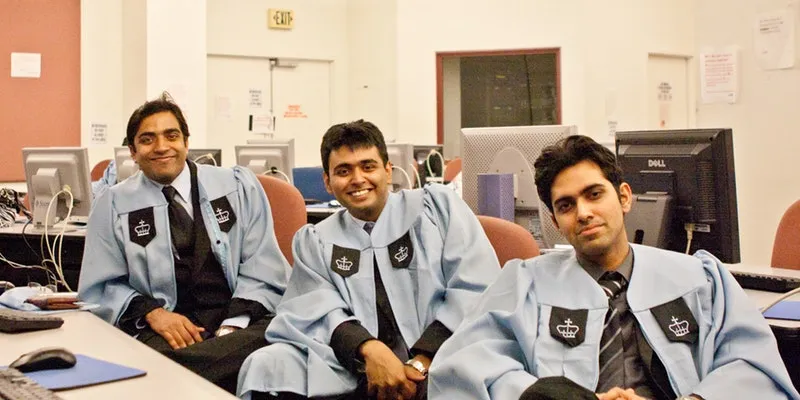
Mukund with batchmates at Columbia University
India calling
“By 2015, I came back to India as I was getting married, and my wife didn’t want to move to the US. After returning to India, I started figuring out what to do next,” Mukund says.
During this time, his father was running a chip designing electronics company and Mukund decided to add a Bengaluru office. But six months down the lane, he realised project management was not fun, and figured it wasn’t his cup of tea.
By then, he thought of recruitment as a space, and met Ankur (Co-founder of Dunzo), through his brother-in-law. At that point in time, Ankur was building Fundoo Naukri, where freshers get jobs and projects based on a test. Though the idea was good, there were a few implementation challenges.
“We teamed up and were thinking of ways to make it work. We soon morphed into a hacker rank kind of a platform. But again, while building the product was easy, the sales was difficult. So Ankur and I got into another brainstorming session,” Mukund says.
It was then that they built an AI assistant for shopping around early 2015. And at the same time, ‘Magic’ happened in the US, which would get the user anything through a text message.
It felt like a great minimum viable product (MVP) to build, and they also decided to integrate it with WhatsApp and build it out.
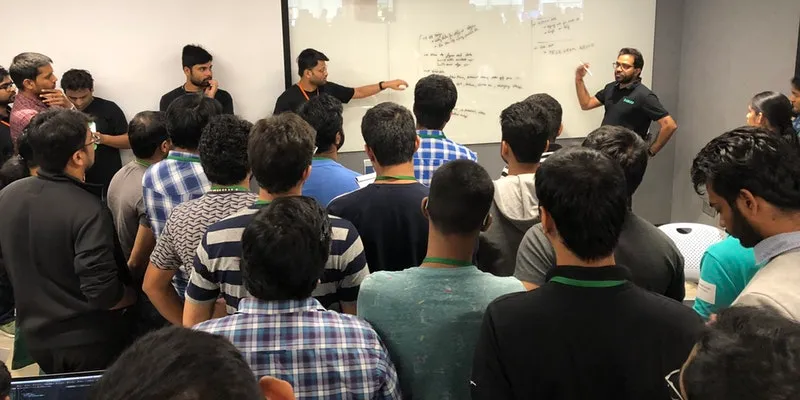
Mukund Jha with team at a recent Blume Ventures Hackathon
Building Dunzo
“We called it Wingman - text anything on WhatsApp and you get it done. A month and a half into building it, and we started to reach out to investors. It was during this time that Blume Ventures connected us to Kabeer (Biswas). We were both doing the same thing. We met for a month and felt there was a great synergy. So, in July 2015, we co-founded Dunzo,” Mukund says.
Initially, Dunzo was running on WhatsApp. “The initial zero-to-one journey is always fun,” Mukund adds. However, the biggest bottleneck was that a lot of people were using WhatsApp, and a lot of the operators weren’t able to get them to shift.
So, they wrote a hack on WhatsApp where they would get the messages on the interface. It made the backend operations simpler, people could work on the interface, and it helped the team build strong operations, while the consumer side kept running on WhatsApp.
“We built the partners’ side product and operations side. One of the mistakes was that initially we were really stuck on designs, and we wanted to get the best design with multiple iterations. We wanted to be able to do everything from the first go. But there were multiple parallel processes, understanding a text and getting that into multiple tasks. So even before our consumer app launched, operationally we had figured out a lot of things on the backend, and it was a great learning,” Mukund explains.
Quick turnaround
Today, for Mukund, coding is about things that aren’t critical to timelines or anything that isn’t directly connected to Dunzo.
“I think of my strength as someone who can think of an idea and ensure that it can be put into someone’s hand really quickly. A lot of that helped when starting up as we would build so many things in parallel,” Mukund says.
Dunzo was initially started as a purely chat-based product. But the team realised that supply was something they needed to focus on. They also needed to focus on partners, because all their tasks were purely based on logistics.
Speaking of the tech that goes into building Dunzo, Mukund says,
“A large part of what our tech does is take the complex workflows in life and make them into systems behaving predictively. For running a single task, there are thousands of variables running on the computer - are you a new user, a user moving from a different city, task from a store that we have tied up with or not, does the store have a PoS machine, etc. We have started focusing on things that are high volume and can be run predictably well. We have written and rewritten systems multiple times to keep up with the pace of growth.”
He says, language and technology keep transitioning, and it is best not to be stuck with one.
“We ourselves are transitioning. We started out with Python as the main language, and today Go is becoming a prominent language. Hence, I look for someone who has an ability to learn things faster. The space we are in is dynamic, and priorities change. So, you need to have speed,” he adds.
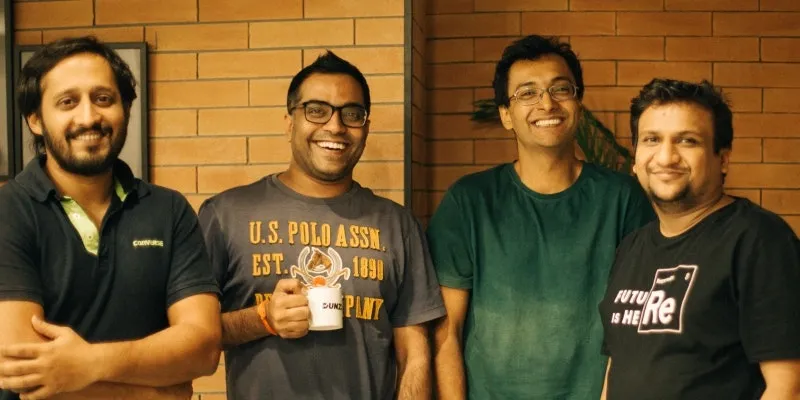
Mukund with the other Dunzo founders
Learning from mistakes
But then no journey is complete without mistakes. “I have been told so many things and have read different things - mistakes not to be done, and you think you wouldn’t make that mistake, but then you do end up making it, because in bits and pieces you do make mistakes, and it is fine,” Mukund says.
What helped them was the urgency and eagerness they had to get things out in the hands of the user and learn from the user. Also, communication and product ownership are important for Mukund. He says, for a product like Dunzo, any change you make has an impact on multiple sides of the business.
“People need to value the end consumer and user, because you are building for them. If you’re fundamentally strong on those concepts, your base is strong, you can build on top of that. We think iterations are really important. The faster you move, the faster you iterate, and the more time you will have to find the right niche and fit for your product,” Mukund says.
He believes that a person in tech should really think of consumers and product as it adds a very high leverage on how you build things. Mukund believes, “You need to be able to relate from an impact point of view and then build something technology gives you the power to create things. And with a B2C product, you can touch and feel the app, and you see it out in the real world, the infinite possibility it creates is high. It gives you a lot of creative power, you can think of lot of things and build it out. We are barely scratching the surface when it comes to what we can actually do. It is just going to keep integrating deeper in our lives.”
Mukund’s advice to new engineers and techies is to “try everything”. He says, “Join a startup, as the learning curve is super high, and start building.The moment you try something it becomes super easy, keep experimenting, try new things on the side. Spend time networking with the right kind of people, fresh engineers don’t network enough.”
He says, “Can you build something for a problem that is bothering you? I have my own bot, which emails me a newsletter.”
(Edited by Megha Reddy)


![[Techie Tuesday] From working on Google’s search platform to co-founding Dunzo - the journey of Mukund Jha](https://images.yourstory.com/cs/2/a9efa9c0-2dd9-11e9-adc5-2d913c55075e/techi-tuesday_(800x400)1566210615008.png?mode=crop&crop=faces&ar=2%3A1&format=auto&w=1920&q=75)

![[Techie Tuesday] A reluctant engineer who went on to build tech products before their time - th...](https://images.yourstory.com/cs/2/3fb20ae0-2dc9-11e9-af58-c17e6cc3d915/Techie-tuesday-Ramki-Gaddipati-800x4001565613417336.png?fm=png&auto=format&h=100&w=100&crop=entropy&fit=crop)
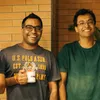

![[Techie Tuesday] How Razorpay’s Shashank Kumar built India’s first online payment gateway for s...](https://images.yourstory.com/cs/2/730b5070-2d6c-11e9-aa97-9329348d4c3e/Shashank_Kumar_TechieTuesday-011564425520224.png?fm=png&auto=format&h=100&w=100&crop=entropy&fit=crop)
![[Techie Tuesday] He began coding at 10 and went on to build blockchain-powered phones: meet Pun...](https://images.yourstory.com/cs/2/730b5070-2d6c-11e9-aa97-9329348d4c3e/Techie-tuesday--Pitt-Huang,-CTO,-Pundi-X1563805309282.png?fm=png&auto=format&h=100&w=100&crop=entropy&fit=crop)
![[Techie Tuesday] Sanjeev Barnwal of Facebook-backed Meesho has one advice for coders: ‘get out ...](https://images.yourstory.com/cs/2/a9efa9c0-2dd9-11e9-adc5-2d913c55075e/Sanjeev_800_4001562586046701.jpg?fm=png&auto=format&h=100&w=100&crop=entropy&fit=crop)